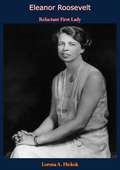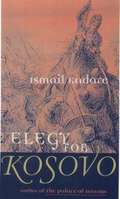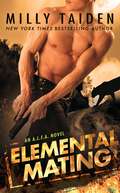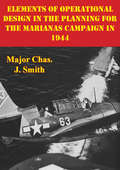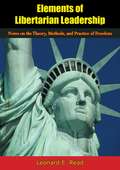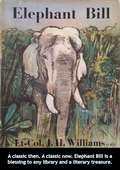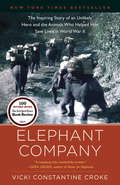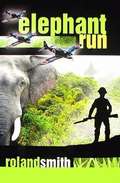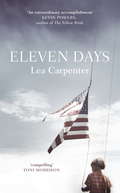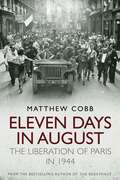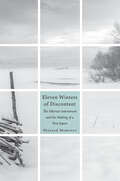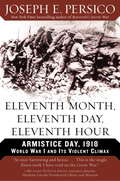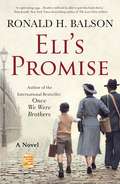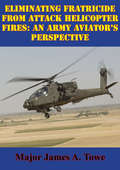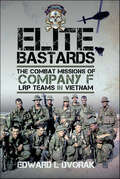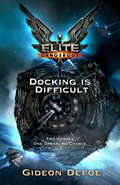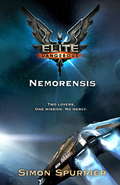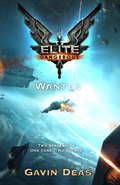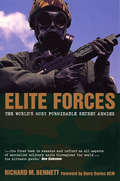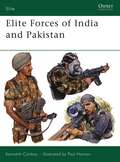- Table View
- List View
Eleanor Roosevelt: Reluctant First Lady
by Lorena A. HickokLORENA HICKOK is in a unique position to write the story of Eleanor Roosevelt’s transition from a private individual to First Lady of the land. As a newspaper reporter, she had known Mrs. Roosevelt since Al Smith’s campaign for President, and she was assigned by the Associated Press to cover her during her husband’s presidential campaign in 1932. With this new assignment, the two shortly became, as they have remained, very good friends.The author was at Mrs. Roosevelt’s side throughout the momentous days of the campaign, election and inauguration. A frequent guest at the White House, she witnessed the adjustment of its new mistress to the occupancy of that residence. Together, they took the last trips that Mrs. Roosevelt attempted in a vain effort to preserve her anonymity. Reluctant First Lady gives a fascinating and heart-warming insight into the problems and sacrifices that confront an active private citizen, wife and mother, whose husband becomes President of the United States.
Eleanor's Story: An American Girl In Hitler's Germany
by Eleanor Ramrath GarnerA COMPELLING AND EVOCATIVE story that immerses readers in the daily struggles of surviving World War II. Eleanor's Story is the dramatic autobiography of Eleanor Ramrath Garner's youth, growing up as an American caught in World War II Berlin. It's a story of trying to maintain stability, hope, and identity in a world of terror and contrasts. During the Great Depression, when she is nine, Eleanor's family moves from her beloved America to Germany, where her father has been offered a good job. But war breaks out as her family is crossing the Atlantic, and they cannot return to the United States. Eleanor tries to maintain her American identity as she feels herself pulled into the turbulent life roiling around her. She fervently hopes for an Allied victory, yet for years she must try to survive the Allied bombs shattering her neighborhood. Her family faces separations, bombings, hunger, the final fierce battle for Berlin, the Russian invasion, and the terrors of Soviet occupancy. This compelling story immerses us in the daily struggles of surviving World War II as a civilian. It puts a very human face on the horrors of war and helps us understand that each casualty of war is a person, not a number.
Elegy for Kosovo: Stories
by Peter Constantine Ismail KadareJune 28, 1389: Six hundred years before Serbian leader Slobodan Milosevic called for the repression of the Albanian majority in Kosovo, there took place, on the Field of the Blackbirds, a battle shrouded in legend. A coalition of Serbs, Albanian Catholics, Bosnians, and Rumanians confronted and fell to the invading Ottoman army of Sultan Murad. The battle established the Muslim foothold in Europe and became a centerpiece of Serbian nationalist ideology, justifying the campaign of ethnic cleansing of Albanian Kosovars that the world witnessed with horror at the end of the last century. In this eloquent and timely reflection on war, memory, and the destiny of two peoples, Ismail Kadare explores in fiction the legend and the consequences of that defeat. Elegy for Kosovo is a heartfelt yet clear-eyed lament for a land riven by hatreds as old as the Homeric epics and as young as the latest news broadcast.
Elegy on Kinderklavier (Linda Bruckheimer Series In Kentucky Literature Ser.)
by Arna Bontemps Hemenway<P>The stories in Elegy on Kinderklavier explore the profound loss and intricate effects of war on lives that have been suddenly misaligned. <P>A diplomat navigates a hostile political climate and an arranged marriage in an Israeli settlement on a newly discovered planet; a small town in Kansas shuns the army recruiter who signed up its boys as troops are deployed to Iraq, falling in helicopters and on grenades; a family dissolves around mental illness and a child's body overtaken by cancer. <P>The moment a soldier steps on an explosive device is painfully reproduced, nanosecond by nanosecond. <P> Arna Bontemps Hemenway's stories feel pulled out of time and place, and the suffering of his characters seem at once otherworldly and stunningly familiar. <P>Elegy on Kinderklavier is a disquieting exploration of what it is to lose and be lost.Arna Bontemps Hemenway's fiction has appeared in The Missouri Review, A Public Space, the Seattle Review, and Ecotone. Originally from Kentucky, he holds an MFA from the Iowa Writers' Workshop, and has received scholarships from the Sewanee Writers' Conference and Truman Capote Literary Trust.
Elemental Mating
by Milly TaidenTheir existence was a secret the government stumbled upon. In exchange for continued autonomy, the paranormals entered an alliance with the government. Now they are A.L.F.A.: Alpha League Federal Agency, sworn to protect and serve humanity.Brilliant scientist Melinda Caster has discovered a new strain of the Zika virus that stimulates synaptic growth in embryos, causing neuron development beyond normal human levels. Way beyond, like ESP-levels of cognitive abilities. When the lab is broken into, Melinda realizes that someone has been keeping tabs on her research and wants it for themselves. A happy accident destroys critical data before it can fall into the wrong hands, but unfortunately that makes Melinda and her perfect memory a target. A.L.F.A sends in jaguar-shifter Agent Parish Hamel to discover who is after the virus and why. The beautiful scientist acts like catnip to his senses and throws his mating instincts into overdrive. And then she disappears along with the only sample of the virus…. Now Parish must canvas the darkest areas of the supernatural underground to rescue Melinda, and what he discovers is beyond a paranormal’s worst nightmare.
Elements Of Operational Design In The Planning For The Marianas Campaign In 1944
by Major Chas. J. SmithOperational art and the operational level of war became a doctrinal focus for the U.S. Army in the 1980s. This focus led to the development of the elements of operational design. These concepts are not new, and were developed in the interwar period prior to World War II at the staff and war colleges. During this time, however, the military did not doctrinally recognize the operational level or war or operational art. Even though the concepts were not recognized, the intellectual process permeated the officer education system prior to World War II. Clearly, American officers in World War II used something of operational art, including in the planning and execution of the Marianas Campaign. This monograph looks at the question in more detail, by testing the extent to which planners within CENPAC used the elements of operational design in the Marianas Campaign, including end state and objectives, effects, center(s) of gravity, decisive points, direct and indirect action, lines of operation, operational reach, simultaneity and depth, timing and tempo, leverage, balance, anticipation, culmination, and arranging operations. The implication of this study is that as current doctrine evolves, the development, education, and execution of operational concepts in the World War II era continue to be useful.
Elements of Libertarian Leadership: Notes on the Theory, Methods, and Practice of Freedom
by Leonard E. ReadIn this book, first published in 1962, the author and founder of the Foundation for Economic Education, Leonard E. Read, skilfully organizes his numerous, previously published FEE materials into a single, usable manual “for those who would give liberty a hand.”“The emphasis in this volume is on methodology. Assuming an individual has mastered the philosophical aspects of freedom, what can he do about it? With whom does he work? What are his limitations? His potentialities?”—Leonard E. Read, Foreword
Elephant Bill
by Lt.-Col. J. H. Williams O.B.E.A book comes along like this once in a lifetime. You read it as a small child, or even an adult, and never forget the images it conjures up of a wonderful Englishman who lives in the mysterious forests of faraway Burma and of the kind native people who teach him about their lovely country. But most of all, you never forget the elephants! For this is a story about those magnificent creatures. Though he was officially known as Lt. Colonel J. H. Williams, the author was known to the world at large as Elephant Bill. That is because he spent 25 years living with the elephants in the mountains and forests of Burma. There he trained them to haul teak logs out of the isolated jungles.Yet this is also a story of great courage, because when the Second World War struck it also came to Burma. The Japanese Imperial Army planned to confiscate the Burmese elephants, drafting them to make the bridges and railways they needed to invade India. When he learned of these plans to put his beloved animals to a war-like purpose, Elephant Bill knew what had to be done. The mighty kings of the jungle had to be evacuated to safety.This is thus the story not only of the peaceful days in the jungle, starting in 1921, but also the story of the largest elephant rescue in history. It tells the amazing account of how Elephant Bill, along with his friends and family, rode 45 of the great beasts across the mountains of Burma, before reaching safety in faraway India.A classic then. A classic now. Elephant Bill is a blessing to any library and a literary treasure.
Elephant Company: The Inspiring Story of an Unlikely Hero and the Animals Who Helped Him Save Lives in World War II
by Vicki Constantine CrokeThe remarkable story of James Howard “Billy” Williams, whose uncanny rapport with the world’s largest land animals transformed him from a carefree young man into the charismatic war hero known as Elephant Bill<P> Billy Williams came to colonial Burma in 1920, fresh from service in World War I, to a job as a “forest man” for a British teak company. Mesmerized by the intelligence, character, and even humor of the great animals who hauled logs through the remote jungles, he became a gifted “elephant wallah.” Increasingly skilled at treating their illnesses and injuries, he also championed more humane treatment for them, even establishing an elephant “school” and “hospital.” In return, he said, the elephants made him a better man. The friendship of one magnificent tusker in particular, Bandoola, would be revelatory. In Elephant Company, Vicki Constantine Croke chronicles Williams’s growing love for elephants as the animals provide him lessons in courage, trust, and gratitude.<P> But Elephant Company is also a tale of war and daring. When Imperial Japanese forces invaded Burma in 1942, Williams joined the elite Force 136, the British dirty tricks department, operating behind enemy lines. His war elephants would carry supplies, build bridges, and transport the sick and elderly over treacherous mountain terrain. Now well versed in the ways of the jungle, an older, wiser Williams even added to his stable by smuggling more elephants out of Japanese-held territory. As the occupying authorities put a price on his head, Williams and his elephants faced his most perilous test. In a Hollywood-worthy climax, Elephant Company, cornered by the enemy, attempted a desperate escape: a risky trek over the mountainous border to India, with a bedraggled group of refugees in tow. Elephant Bill’s exploits would earn him top military honors and the praise of famed Field Marshal Sir William Slim.<P> Part biography, part war epic, and part wildlife adventure, Elephant Company is an inspirational narrative that illuminates a little-known chapter in the annals of wartime heroism.
Elephant Run
by Roland SmithIn 1941, bombs drop from the night skies of London, demolishing the apartment Nick Freestone lives in with his mother. Deciding the situation in England is too unstable, Nick's mother sends him to live with his father in Burma, hoping he will be safer living on the family's teak plantation. But as soon as Nick arrives, trouble erupts in the remote Burmese elephant village. Japanese soldiers invade, and Nick's father is taken prisoner. Nick is left stranded on the plantation, forced to work as a servant to the new rulers. As life in the village grows more dangerous for Nick and his young friend, Mya, they plan their daring escape. Setting off on elephant back, they will risk their lives to save Nick's father and Mya's brother from a Japanese POW camp.
Eleven Days
by Lea CarpenterLONGLISTED FOR THE BAILEYS WOMEN'S PRIZE FOR FICTION 2014'SUPERB' - SIMON SEBAG MONTEFIORE, LONDON EVENING STANDARD BOOKS OF THE YEAR 2013'EXTRAORDINARY' - KEVIN POWERS, AUTHOR OF THE YELLOW BIRDS'THINK HOMELAND IN FICTION FORM...' - RED'AN EXTRAORDINARILY GIFTED WRITER' - MICHIKO KAKUTANI, NEW YORK TIMESEleven Days is, at its heart, the story of a mother and a son.It begins in May 2011: Sara's son Jason has been missing for nine days in the aftermath of a special operations forces mission. Out of devotion to him, Sara has made herself knowledgeable about things military, but she knows nothing more about her son's disappearance than the press corps camped out in her driveway. In a series of flashbacks we learn about Jason's absentee father - a man who died, according to "insiders," helping to make the country safer - and Jason's decision to join the U.S. Naval Academy at Annapolis after 9/11 and enter into the toughest military training in the world: for the U.S. Naval Special Warfare's Navy SEAL Teams. Through letters Jason wrote his mother while training, we see him becoming a strong, compassionate leader. But his fate will be determined by events that fall outside the sphere of his training, and far outside the strong embrace of his mother's love. As well as a touching picture of the bond between a mother and a son this is a unique look into the training, history and culture of one of the world's elite forces. Page-turning and haunting, this is an astonishing debut which questions the very nature of sacrifice and love.
Eleven Days in August: The Liberation of Paris in 1944
by Matthew Cobb'I had thought that for me there could never again be any elation in war. But I had reckoned without the liberation of Paris - I had reckoned without remembering that I might be a part of that richly historic day. We were in Paris on the first day - one of the great days of all time.' (Ernie Pyle, US war correspondent)The liberation of Paris was a momentous point in twentieth-century history, yet it is now largely forgotten outside France. Eleven Days in August is a pulsating hour-by-hour reconstruction of these tumultuous events that shaped the final phase of the war and the future of France, told with the pace of a thriller. While examining the conflicting national and international interests that played out in the bloody street fighting, it tells of how, in eleven dramatic days, people lived, fought and died in the most beautiful city in the world. Based largely on unpublished archive material, including secret conversations, coded messages, diaries and eyewitness accounts, Eleven Days in August shows how these August days were experienced in very different ways by ordinary Parisians, Resistance fighters, French collaborators, rank-and-file German soldiers, Allied and French spies, the Allied and German High Commands.Above all, it shows that while the liberation of Paris may be attributed to the audacity of the Resistance, the weakness of the Germans and the strength of the Allies, the key to it all was the Parisians who by turn built street barricades and sunbathed on the banks of the Seine, who fought the Germans and simply tried to survive until the Germans finally surrendered, in a billiard room at the Prefecture of Police. One of the most iconic moments in the history of the twentieth century had come to a close, and the face of Paris would never be the same again.
Eleven Exiles: Accounts of Loyalists of the American Revolution
by John Grant Phyllis R. BlakeleyEleven Exiles is a personal account of the American Revolution. By focusing on eleven different people who were on the losing side of the American Revolution, and who had to make new lives for themselves in what remained of British North America. Eleven Exiles reflects the major themes of those turbulent years. What were the attitudes of these men and women toward the significant social and political ideas of the time? What motivated them to leave their home and move to a wildnerness? What challenges and hardships did they face?
Eleven Winters of Discontent: The Siberian Internment and the Making of a New Japan
by Sherzod MuminovThe odyssey of 600,000 imperial Japanese soldiers incarcerated in Soviet labor camps after World War II and their fraught repatriation to postwar Japan. In August 1945 the Soviet Union seized the Japanese puppet state of Manchukuo and the colony of Southern Sakhalin, capturing more than 600,000 Japanese soldiers, who were transported to labor camps across the Soviet Union but primarily concentrated in Siberia and the Far East. Imprisonment came as a surprise to the soldiers, who thought they were being shipped home. The Japanese prisoners became a workforce for the rebuilding Soviets, as well as pawns in the Cold War. Alongside other Axis POWs, they did backbreaking jobs, from mining and logging to agriculture and construction. They were routinely subjected to “reeducation” glorifying the Soviet system and urging them to support the newly legalized Japanese Communist Party and to resist American influence in Japan upon repatriation. About 60,000 Japanese didn’t survive Siberia. The rest were sent home in waves, the last lingering in the camps until 1956. Already laid low by war and years of hard labor, returnees faced the final shock and alienation of an unrecognizable homeland, transformed after the demise of the imperial state. Sherzod Muminov draws on extensive Japanese, Russian, and English archives—including memoirs and survivor interviews—to piece together a portrait of life in Siberia and in Japan afterward. Eleven Winters of Discontent reveals the real people underneath facile tropes of the prisoner of war and expands our understanding of the Cold War front. Superpower confrontation played out in the Siberian camps as surely as it did in Berlin or the Bay of Pigs.
Eleventh Month, Eleventh Day, Eleventh Hour: The War to End All Wars and Its Violent End
by Joseph E. PersicoThe story of the day on which World War I, the war to end all wars, ended. Using military archives and public records, along with journals and diaries, the book will weave together the eleventh hour experiences of the famous, such as Lloyd George, President Woodrow Wilson, Field Marshall Haig and General Pershing. But more dominantly, it will deal with the ordinary men in the trenches, unsung and unremembered, the British Tommies, French Poilus, American Doughboys and German Feldgrau. Where, for example, was the Austrian corporal, Adolf Hitler, on that day? Four days before the War's end, with peace talks already underway, the beaten Germans propose an interim ceasefire to spare lives. However, the French Allied Commander, General Ferdinand Foch, refuses. Hostilities will not cease, Foch insists, before the appointed hour of the Armistice. Thus, even on the last day, the Allies are still launching full scale offenses and both sides bombard each other until the final minute of the agreed ceasefire, 11am, November 11, 1918. The last hours pulsate with tension as men in the trenches, airmen in the sky and sailors at sea hope to escape the melancholy distinction of being the last to die in the War.
Eli's Promise: A Novel
by Ronald H. Balson"National Jewish Book Award winner Ron Balson returns triumphantly with Eli’s Promise, a captivating saga of the Holocaust and its aftermath spanning decades and continents. Readers will not be able to put this book down, but will turn the pages compulsively with heart in throat, eager to learn the fate of the Rosen family. Balson’s meticulous historical detail, vivid prose and unforgettable characters further solidify his place among the most esteemed writers of historical fiction today."—Pam Jenoff, New York Times Bestselling Author of The Lost Girls of Paris A "fixer" in a Polish town during World War II, his betrayal of a Jewish family, and a search for justice 25 years later—by the winner of the National Jewish Book Award.Eli's Promise is a masterful work of historical fiction spanning three eras—Nazi-occupied Poland, the American Zone of post-war Germany, and Chicago at the height of the Vietnam War. Award-winning author Ronald H. Balson explores the human cost of war, the mixed blessings of survival, and the enduring strength of family bonds.1939: Eli Rosen lives with his wife Esther and their young son in the Polish town of Lublin, where his family owns a construction company. As a consequence of the Nazi occupation, Eli’s company is Aryanized, appropriated and transferred to Maximilian Poleski—an unprincipled profiteer who peddles favors to Lublin’s subjugated residents. An uneasy alliance is formed; Poleski will keep the Rosen family safe if Eli will manage the business. Will Poleski honor his promise or will their relationship end in betrayal and tragedy?1946: Eli resides with his son in a displaced persons camp in Allied-occupied Germany hoping for a visa to America. His wife has been missing since the war. One man is sneaking around the camps selling illegal visas; might he know what has happened to her?1965: Eli rents a room in Albany Park, Chicago. He is on a mission. With patience, cunning, and relentless focus, he navigates unfamiliar streets and dangerous political backrooms, searching for the truth. Powerful and emotional, Ronald H. Balson's Eli's Promise is a rich, rewarding novel of World War II and a husband’s quest for justice.
Eliminating Fratricide From Attack Helicopter Fires: An Army Aviator's Perspective
by Major James A. ToweIn the aftermath of the euphoria brought on by our military victory in the Persian Gulf War, is the realization that we still have much to learn. The Persian Gulf War appears to have validated the quality of U.S. doctrine, leadership and military prowess. It showcased the technical superiority of our equipment, and confirmed under fire the courage and competence of our soldiers, sailors, airmen, and marines. Yet, even in an overwhelming victory there are painfully hard lessons to be learned, or in the case of fratricide, relearned.Perhaps no other aspect of our failures strike the military psyche harder than fratricide. This study will suggest that we do not have to accept the fratricide statistics of the past, however factual, as inevitable of future U.S. conflicts. It will propose that the facts of fratricide should be gathered not as a casualty prediction planning tool, but as a focus to design training and operational procedures, which in conjunction with advanced technology will work towards the significant reduction if not the elimination of fratricide from attack helicopter fires.
Elite Bastards: The Combat Missions of Company F, LRP Teams in Vietnam
by Edward L. DvorakThe quintessential first-person combat memoir of a special forces soldier fighting in the jungles of Vietnam. This is the quintessential first-person combat memoir of a special forces soldier at war. Edward Dvorak joined the 173rd Airborne Brigade in Vietnam in the summer of 1967. He then joined Company F, 51st Infantry, Long Range Patrol, Airborne. For Dvorak and his buddies of Company F, LRP, their real training started with the MACV (Military Assistant Command Vietnam) Recondo School at the 5th Special Forces Compound in Nha Trang, South Vietnam. That training culminated with an actual Combat LRP mission. If you lived through the patrol, you graduated. Dvorak would remain with Company F for 19 months going on dozens of combat patrols deep behind enemy lines.
Elite Dangerous: Docking is Difficult (Elite: Dangerous)
by Gideon DefoeSet in the world of bestselling computer game ELITE, and launched to tie in with the latest version, ELITE: DANGEROUS - a game almost 20 years in the making. One of three very distinct - but subtly linked - novels written by major authors who are fans of the game, this novel will be a must-buy not only the 25,000+ people who funded the new game on kickstarter, but also for all of those fans of the original game.On what might be the worst planet in the universe, a young man dreams of the stars. Adventure! Lasers! Women! And the ultimate goal - to become Elite!Unfortunately, Misha has to do his chores first. And learn how to talk to Phoebe, the beautiful customs officer. And leave the planet.But the death of a famous author unexpectedly drags Misha and Phoebe into a system-wide conspiracy, complete with smuggling, international art thieves, multi-system corporations, canapés and exploding pigs. This is Misha's chance to prove he has what it takes!After all, surely anyone can be Elite if they dream...
Elite Dangerous: Nemorensis (Elite: Dangerous)
by Simon SpurrierSet in the world of bestselling computer game ELITE, and launched to tie in with the latest version, ELITE: DANGEROUS - a game almost 20 years in the making. One of three very distinct - but subtly linked - novels written by major authors who are fans of the game, this novel will be a must-buy not only the 25,000+ people who funded the new game on kickstarter, but also for all of those fans of the original game.Two lovers steal a spaceship and go on the run, attacking at random and revelling in the fame and glory their violence brings them. Celebrated by the jaded youth of the Federation and urged on to ever more flashy acts of destruction, they know it won't be long before they are caught and killed.But someone is following the couple. Someone who knows why they are so obsessed with each other. Who knows where they are heading. Who knows why.Someone who knows more about them than they do themselves. And has another plan for their deaths...
Elite Dangerous: Wanted (Elite: Dangerous)
by Gavin DeasSet in the world of bestselling computer game ELITE, and launched to tie in with the latest version, ELITE: DANGEROUS - a game almost 20 years in the making. One of three very distinct - but subtly linked - novels written by major authors who are fans of the game, this novel will be a must-buy not only for the 25,000+ people who funded the new game on kickstarter, but also for all of those fans of the original game.When a routine bit of piracy goes wrong, the crew of the Song of Stone realise that there's a bounty hunter on their tail. One who might, finally, be able to outclass them. The Dragon Queen is feared across space, and for good reason. But even the bounty hunter doesn't realise what she's been hired to do. Or what is in the container she's been sent to retrieve.And she's not the only hunter in the game...Gavin Deas is the pseudonym used by Stephen Deas and Gavin Smith when writing together.
Elite Forces
by R M BennettThe invincible reputation of specialist military units such as the USA's Delta Force, Israel's IDP, and of course, Britian's SAS has grown steadily in recent years. Thanks to a number of successful campaigns and anti-terror operations, from London's Iranian Embassy siege in 1980 to the second Gulf War, in which they played a crucial role, it's now assumed that special forces are ideal for our world of small, localised conflicts - and especially George W Bush's war on terror.Elite Forces: The World's Most Formidable Secret Armies:- Contains over 500 compelling entries that cut through myth and secrecy.- Details the history, selection and training procedures and orders of battle of every major elite fighting force in the world today.- Is packed with hair-raising examples of individual heroism, endurance and courage in adversity.- Is fully up to date and includes recent coalition operations in Afghanistan and Iraq.- Takes an objective look at what happens when things go wrong, as they did most famously during the Gulf War of 1991 and in America's intervention in Somalia in 1993.- Explores the hidden links between elite forces and governments, intelligence organisations and business, and their controversial lack of accountability.- Examines how new technologies have come to the aid of the elite soldier.This is the first book of its kind to examine all aspects of the overlap between elite forces and the hidden worlds of intelligence and counter-terrorism, and takes an objective look at the secret, controversial role of special forces and 'Freelancers' in covert, deadly operations around the world. Elite Forces is a compelling, revealing - and occasionally shocking - read, and an authoritive and easy-to-use reference resource.
Elite Forces Selection (Special Forces: Protecting, Building, Te)
by Jack MontanaElite forces only want the best men in their ranks. That is why their selection courses are the toughest in the world. Only one out of every four recruits to the United States Army Rangers, for instance, make it through all phases of their training. Elite Forces Selection takes you into the heart of special unit training, and shows you what you need to do to pass. Fitness and preparation come first; then you have to face everything from brutal speed marches to the underwater tests of the U.S. Navy SEALs. The selection courses of individual units are examined, revealing: * How the Navy SEALs train themselves to prevent drowning. * How the Special Forces become medical experts. * How you can control your mind in order to succeed.
Elite Forces of India and Pakistan
by Kenneth Conboy Paul HannonInfluenced by the German use of paratroopers early in World War II (1939-1945), General Sir Robert Cassels, the Commander-in-Chief India, ordered the formation of an airborne cadre in October 1940. Thus marked the origins of India's first élite units. Pakistan can trace the origins of its own army airborne to the common parentage of British-raised forces. Following the partition from India in August 1947, it raised its own Special Service Group, with individually specialised companies including desert, mountain, ranger and underwater warfare units. This remarkable volume by Kenneth Conboy details the history, organisation, uniforms and insignia of the élite forces of India and Pakistan. Also covered are the elite forces of Afghanistan, Nepal, Sri Lanka, and Bangladesh.
Elite Panzer Strike Force
by Franz KurowskiStory of one of the best and most battered armored divisions in the German armed forces.
